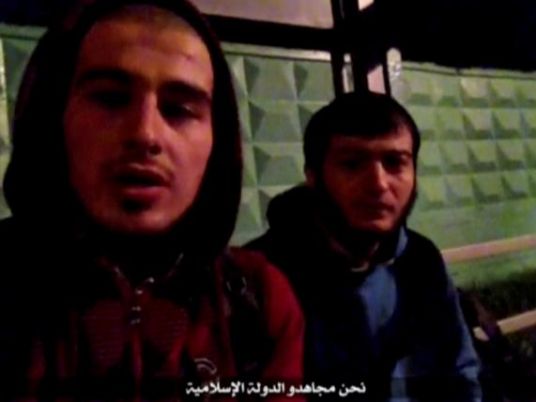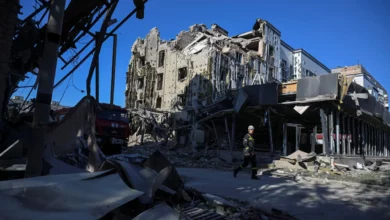
An Islamic State supporter who was shot dead in Russia after he attacked police officers with an axe had planned to travel to Germany to join members of his family there, two people who knew him told Reuters.
Usman Murdalov, 21, and his friend Sulim Israilov, 18, armed themselves with axes and attacked a traffic police post near Moscow on Aug. 17. In a video posted online a day later, they professed loyalty to Islamic State.
The two people who knew him said that Murdalov, up to the point when he left his home village in the Russian region of Chechnya on Aug. 12, had been making arrangements to travel to Germany to join his father and his step-mother who moved there three months earlier.
Germany has seen a spate of violent attacks in the past few months, including two blamed on Islamists. Security officials have said that people with extremist links, some of them Chechens, are getting into Germany by passing themselves off as migrants and asylum seekers.
Ingo Decker, head spokesman for the interior ministry of the German state of Brandenburg, declined to comment on Murdalov or his family, but said the state had been dealing with large numbers of Chechen refugees for years.
"A large majority of those refugees come from the Islamic republics of Russia, and they generally come through eastern Europe," Decker said.
"Nearly all the Islamists and suspected terrorists that we are tracking in our state come from these regions, not generally from Iraq or Syria."
German plans
Chechnya is a mainly Muslim region of southern Russia which is the scene of a low-level Islamist insurgency. Russian security officials have said about 10,000 people from Russia and other ex-Soviet republics are fighting in the Middle East in the ranks of jihadist groups. There are no figures for the number of Chechens, but they make up a significant contingent within Islamic State in Iraq and Syria.
In the village of Valerik, where Murdalov had his family home, a relative said that Murdalov had successfully applied to the Russian authorities for a passport so he could travel to Germany.
"He did not have a visa," to enter Germany, the relative said. "His family, who left earlier, didn't have visas either."
A neighbor in Valerik, who knows the family, also said Murdalov was planning to go to Germany, following his family.
"They went there illegally by car through Poland. That's for sure," the neighbor said, adding that he did not know their current location.
People in the village said they could not explain why Murdalov had scrapped his plan to travel to Germany.
He was last seen in Valerik on Aug. 12, when he and Israilov said they were leaving for the nearby Caspian Sea resort of Izberbash for a break.
Five days later, the two attacked the police post in Balashikha, a town near Moscow and about 1,900 km (1,200 miles) from Izberbash. They injured two police officers, one of whom later died in hospital. Murdalov and Israilov were shot dead.
A day later, Islamic State media channels released a video purporting to show Murdalov and Israilov before the attack.
"We are in Moscow on the orders of our emir, our caliph, Omar al-Baghdadi, who ordered us to do everything in our power," one of the men said in the video, referring to the leader of Islamic State.
"We are calling this a revenge operation, revenge because you are killing our brothers, because you are killing our brothers and sisters every day in Iraq and Syria."
People pledging allegiance to Islamic State have staged violent attacks in Russia's mainly Muslim north Caucasus region, but the Balashikha attack was the first time Islamic State sympathizers had mounted an attack so close to Moscow.
College dropout
Relatives of Murdalov and Israilov said neither man had exhibited signs of radicalisation. They said they could not understand what could have changed in them to make them carry out the attack.
Murdalov and Israilov worked together at a small manufacturing company in Valerik producing windows and doors, according to relatives. The business is owned by Murdalov's family.
The relatives said that Israilov's parents divorced when he was a baby. He was raised by his father and his father's second wife, whom he believed to be his biological mother. He only found out she was his step-mother when his biological mother visited him, unannounced, at his school, when he was a teenager.
Israilov had been in his second year at a teacher training college in Grozny, the Chechen capital, where he studied physics and information technology.
He was expelled from the college due to poor academic performance on Feb. 24 this year, according to a document seen by Reuters.
A college official said she did not know what happened to him. "He used to have good marks but later he got worse," she said.
Israilov's aunt, who did not want to be identified, said the police visited the family and told them he died in the attack.
"We didn't want to believe it because a person who was supposed to be in Izberbash turned out to be in Moscow and, furthermore, in such circumstances."
Russian influx
Decker, the Brandenburg interior ministry spokesman, said the state was aware of about 80 suspected Islamist extremists in its jurisdiction, including several dozen with previous combat experience. Most were from the North Caucasus, which includes Chechnya.
Those Islamists melt into the growing number of Russian citizens – many of them Chechens – who enter Germany seeking asylum. Applications recorded in Brandenburg from Russians in the first six months of this year stand at 1,764, already exceeding the number for the whole of 2015.
Security officials said many people who pose a potential security threat enter Germany via Poland, a border that has only very limited immigration controls because the two countries are part of the European Union's free movement zone.
Anja Ducklauss-Nitschke, deputy chief of Germany’s federal police union, said it was practically impossible to even determine if the Murdalov family was in Germany given the lack of controls at the German-Polish border.
“Without fingerprints and other personal data, it’s practically not even researchable,” she said. “That’s what’s so horrifying.”




